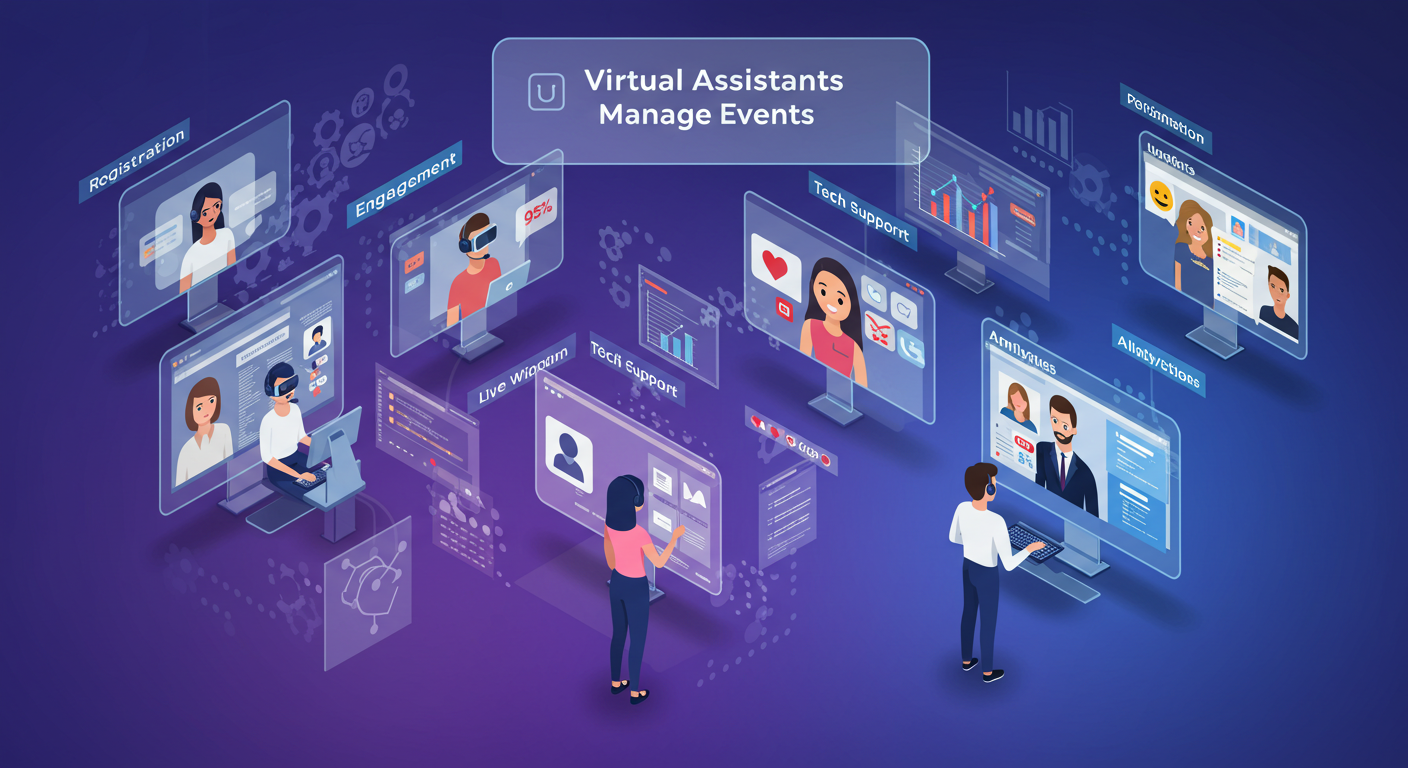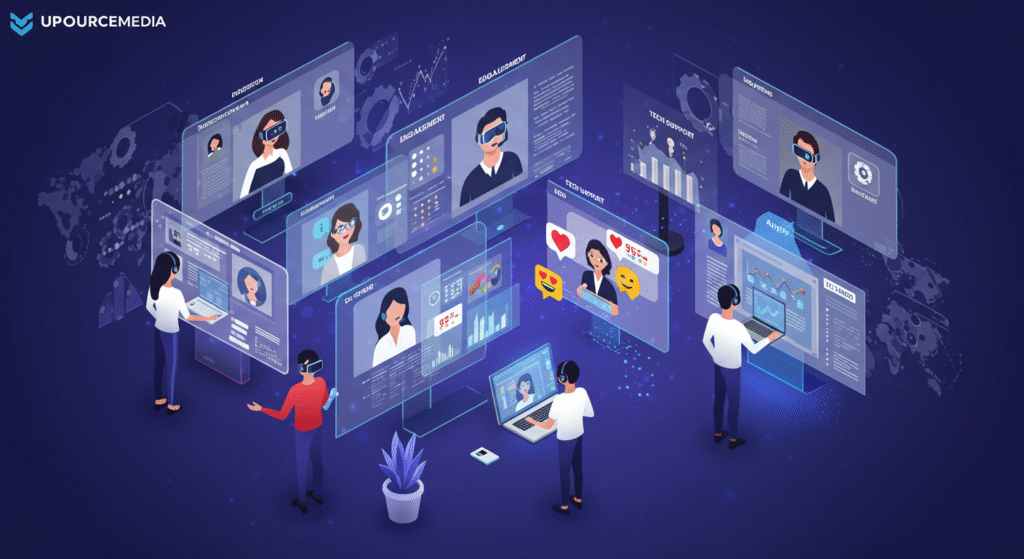Virtual events have become a cornerstone of modern business, education, and social interactions. From corporate webinars to virtual weddings, the demand for seamless event execution has skyrocketed. But who ensures these digital gatherings run smoothly? Enter virtual assistants (VAs)—the behind-the-scenes experts who manage everything from scheduling to attendee engagement and understand exactly how virtual assistants manage virtual events.
These skilled professionals act as digital conductors, orchestrating every detail to create immersive and glitch-free experiences.VAs handle guest lists, tech issues, and audience engagement – the invisible framework for successful virtual events. UPSOURCEMEDIA transforms chaotic online gatherings into polished experiences that impress.
Hybrid work and global audiences make professional virtual coordination essential for maintaining digital connections.
The Role of Virtual Assistants in Event Coordination
Virtual assistants play a pivotal role in organizing and managing online events. Unlike traditional event coordinators, VAs handle everything remotely, leveraging digital tools to ensure seamless execution. Here’s how they contribute:
1. Pre-Event Planning & Logistics
Before any virtual event goes live, skilled virtual assistants lay the groundwork through meticulous preparation. They transform abstract concepts into flawlessly executed digital experiences by:
- Platform Selection & Setup: Choosing the ideal virtual venue (Zoom, Hopin, Microsoft Teams) based on event size, interactivity needs, and technical requirements
- Master Scheduling: Coordinating across time zones to create realistic run-of-show documents that account for presenter transitions, breaks, and audience engagement windows
- Vendor Orchestration: Serving as the central hub between AV teams, graphic designers, speakers, and sponsors to ensure brand consistency and technical harmony
2. Technical Setup & Troubleshooting
While attendees only see the final polished presentation, virtual assistants work tirelessly behind the scenes to ensure every technical element runs smoothly. Their multi-layered approach includes:
Pre-Event Tech Safeguards:
• Conducting 3-stage platform tests (individual, presenter, and full dress rehearsal)
• Creating redundant backup systems for critical components like streaming and audio
• Preparing emergency protocols for common issues (bandwidth drops, login failures)
Real-Time Problem Solving:
• Running simultaneous monitoring of all technical channels during events
• Maintaining “hot-swap” capabilities for presenters experiencing connection issues
• Providing instant attendee support through dedicated help channels
UPSOURCEMEDIA’s technical teams utilize a proprietary “5-Point Stability Framework” that has reduced critical technical failures by 82% across our managed events. We maintain real-time dashboards tracking 17 key performance indicators – from stream latency to participant engagement metrics – allowing for instant adjustments before most attendees notice any issues.
3. Attendee Engagement & Moderation
Virtual assistants don’t just manage events – they create meaningful experiences by transforming passive viewers into active participants. Our engagement specialists employ neuroscience-backed techniques to maintain attention and foster connection:
Dynamic Participation Architecture
• Real-time sentiment analysis adjusting engagement tactics
• Strategic “energy boosters” every 18-22 minutes (polls, breakout rooms, Q&A)
• Personalized outreach to quiet attendees via private chat
Advanced Moderation Tactics
• AI-assisted chat filtering with human oversight
• Speaker-audience “temperature checks” every 30 minutes
• Virtual “room host” system for large-scale networking
4. Post-Event Follow-Ups
The most successful virtual events continue delivering value long after the “end meeting” click. Our virtual assistants implement strategic post-event systems that:
Data-Driven Debrief Process
• Compile 360° analytics (attendance patterns, engagement peaks/dips, poll results)
• Cross-reference technical performance with participant feedback
• Generate executive summaries with actionable insights
Multi-Touch Nurture Campaigns
• Automated yet personalized thank-you sequences
• Dynamic content delivery based on attendee behavior
• Strategic re-engagement triggers for dormant contacts
Why Hire a Virtual Assistant for Event Management?
In today’s digital-first landscape, professional virtual event assistance isn’t just convenient – it’s a competitive necessity. Here’s why leading organizations partner with specialists like:
Cost-Effective – No need for full-time staff; pay only for the services you need while avoiding the hidden costs of employee benefits and training.
Scalability – Easily adjust support based on event size with seamless transitions from intimate board meetings to global conferences.
Expertise – Access professionals familiar with the latest virtual event planning business trends and cutting-edge engagement technologies that drive results.
Time-Saving – Focus on your core responsibilities while the VA handles logistics and solves problems before they impact your attendees’ experience.
Strategic Advantage – Gain a competitive edge with data-driven insights and proven methodologies that maximize your event ROI.
Companies like UPSOURCEMEDIA provide specialized event organizer assistants who streamline the entire process, ensuring a polished and professional experience.
Key Tools Used by Virtual Event Assistants
To execute events flawlessly, VAs rely on advanced tools, including:
- Project Management: Trello, Asana, ClickUp
- Communication: Slack, Microsoft Teams
- Event Platforms: Zoom, Hopin, Eventbrite
- Marketing & Promotion: Mailchimp, Canva, Hootsuite
These tools help remote event planning companies maintain efficiency and deliver exceptional results.
FAQs: How Virtual Assistants Manage Virtual Events
1. What does a virtual event coordinator do?
A virtual event coordinator oversees all aspects of an online event, from planning and promotion to execution and follow-up. They ensure smooth operations by handling logistics, tech checks, and attendee engagement.
2. How can a wedding virtual assistant help?
A wedding industry virtual assistant manages RSVPs, coordinates with vendors, sets up virtual seating arrangements, and troubleshoots tech issues to ensure a seamless digital wedding experience.
3. What’s the difference between an event coordinator and a virtual assistant?
While both manage events, a traditional event coordinator works on-site, whereas a virtual assistant handles everything remotely using digital tools.
4. How do I hire an event manager for a virtual conference?
Platforms like UPSOURCEMEDIA connect you with skilled event managers for hire who specialize in virtual conferences. Simply outline your needs, and they’ll match you with the right professional.
5. Can a VA handle large-scale corporate events?
Yes! Many remote event planning companies specialize in corporate events, offering services like speaker coordination, webinar management, and attendee analytics.
Conclusion
Virtual assistants are the backbone of successful online events, handling everything from logistics to real-time troubleshooting. Whether you’re hosting a corporate summit, a virtual wedding, or an industry webinar, hiring a skilled virtual event planner ensures a seamless experience.
At UPSOURCEMEDIA, we provide expert event organizer assistants who take the stress out of virtual event management. Ready to elevate your next event? Contact us today or explore our services to get started!





